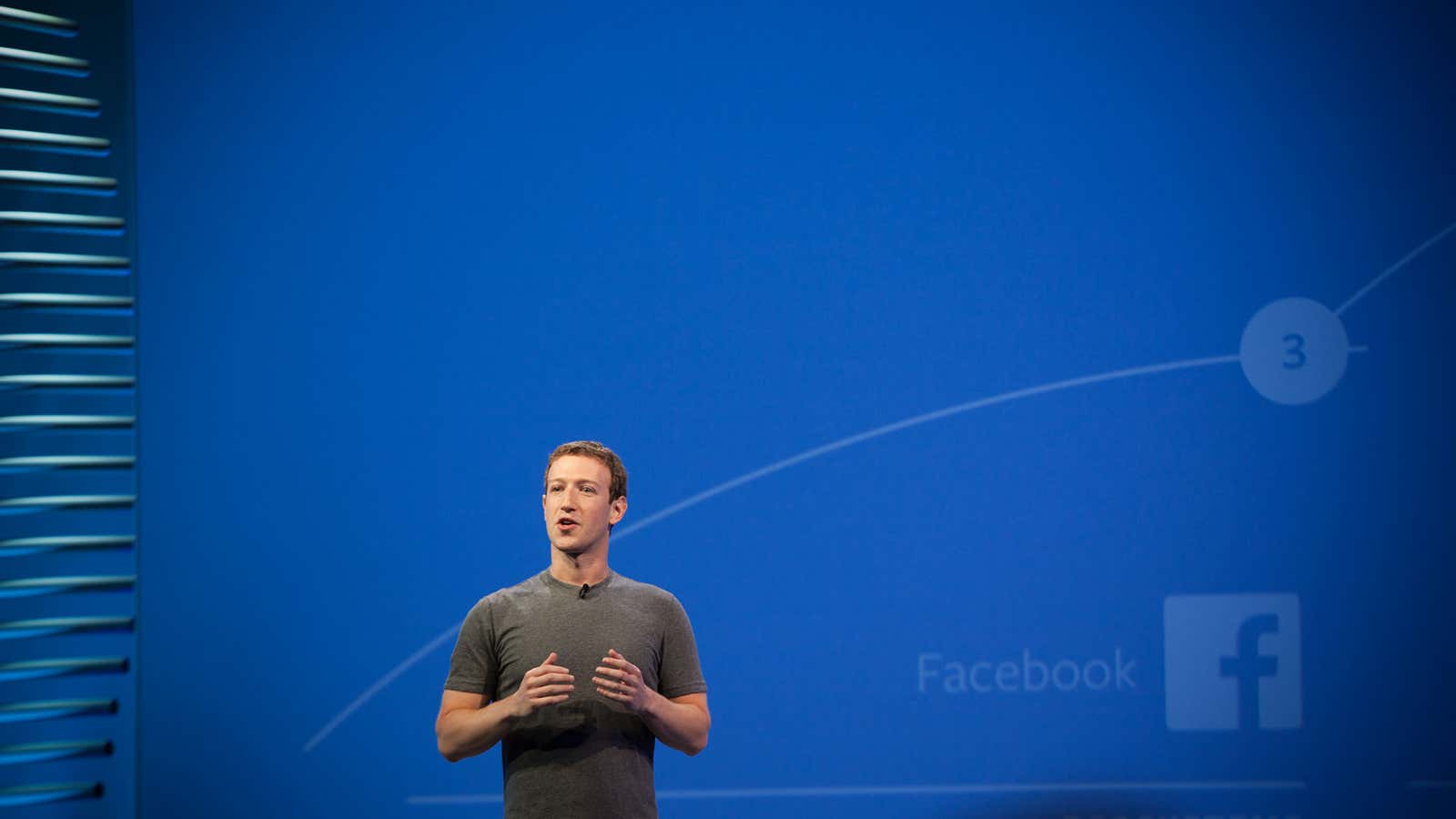Of all of Mark Zuckerberg’s aspirations for Facebook, the loftiest one remains providing internet to parts of the world where it isn’t available. Doing so, he’s said, would help people start businesses, find jobs, access education, and climb out of poverty.
But the barriers are huge. Billions of people have no internet access because the infrastructure hasn’t been built. Enter Facebook, which has an initiative called Internet.org that aims to connect everyone in the world to the internet—and of course, to Facebook.
Facebook has an obvious motive for undertaking this task. It currently has 1.59 billion monthly active users, but as growth slows in North America and Europe, the company is relying on developing countries to continue its momentum.
With Internet.org present in 37 countries, Mark Zuckerberg called it “one of the most successful connectivity initiatives in the world” at the company’s F8 developer conference April 12. Through partnerships with local wireless carriers, Facebook’s Free Basics program has provided free but limited access to the internet. Ultimately, the company aims to deploy drones, satellites, and lasers that beam internet access to remote regions.
Zuckerberg opened the conference with an impassioned keynote, pushing forward his agenda—involving immigration, borders, and connectivity in the developing world—in front of thousands of attendees. Many others will watch online or read about it afterward.
“I hear fearful voices calling for building walls and distancing people they label as others, for blocking free expression, for slowing immigration, reducing trade, and even in some cases around the world, even cutting access to the internet,” the chief executive said. “It takes courage to choose hope over fear, to say that we can build something and make it better than it has ever been before.”
Yes, Zuckerberg was alluding to Republican presidential candidate Donald Trump, who has made erecting “a big, beautiful wall” along Mexico a cornerstone of his presidential campaign.
More interesting was his comment about cutting off access to the internet. No doubt he’s talking about countries like Syria, Yemen, and Burundi that have turned off the internet for their citizens. He also is likely referring to India’s ruling earlier this year to ban Free Basics for violating net neutrality, a principle that dictates telecom operators must provide equal access to the internet.
The ruling in India was a major blow to Internet.org. Zuckerberg had long held up India as a poster child for Internet.org success. More than 1 million Indians had used Free Basics before the app was pulled. Zuckerberg has said that for every 10 people who come online, one person is lifted out of poverty and one new job gets created. Facebook could make a huge impact in India, where about a billion people are not connected to the internet.
Zuckerberg has vigorously defended Internet.org from its critics. An op-ed he wrote last year in the Times of India caused an uproar when he brushed off concerns of net neutrality. “Who could possibly be against [Free Basics]?” he asked. “Surprisingly, over the last year there’s been a big debate about this in India.”
At F8, Zuckerberg continued touting the benefits. “Connectivity will give everyone—not just a third of people in the wealthiest countries—access to all of the opportunities of the internet, including resources for education, health, and jobs,” he said. ”You have to be optimistic to think you can change the world, and people will always call you naive, but it’s this hope and this optimism that is behind every important step forward.”
Yet Internet.org does not provide the same connectivity for poor people as the internet provides for those who are rich. It’s slow, unreliable, and restricts access to a walled garden of sites that Facebook hand picks. How is this internet supposed to lift millions out of poverty?
Free Basics remains a closed platform that makes Facebook a gatekeeper to the internet for the world’s poor. In this role, Facebook is literally picking the winners that benefit from its restricted version. Take 1Doc3, a medical app from Colombia, for example. Touting its success on the Free Basics platform, Zuckerberg said 1Doc3 now gets 21% of its traffic from the program.
He might view Internet.org as a white knight for the developing world, but he fails to see, or at least address, how it’s threatening innovation, reducing competition, and confining the world’s least educated people—millions of whom already believe Facebook is the internet—to its walled garden.
